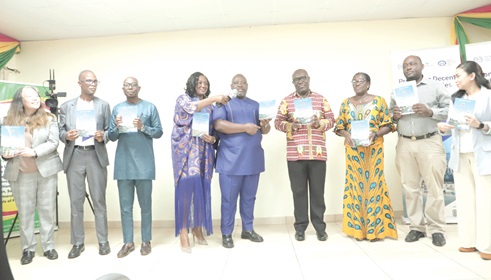
TUC launches policy on decent work in fishing sector
The Trades Union Congress (TUC) has launched a policy to provide guidelines for decent work in the fishing sector.
The policy outlines strategies on how to eradicate forced labour, human trafficking and modern slavery, health and safety deficits, low income, social protection deficits and low trade union coverage.
It is also to ensure fair recruitment practices, well-being and training of fishers, improvement of labour inspections and adherence to existing legal and policy frameworks.
The policy also aims at removing barriers that inhibit the realisation of the rights and interests of fishers and promote collaboration among stakeholders.
It was formulated with support from the International Labour Organisation (ILO).
Collaboration
The Minister of Fisheries and Aquaculture Development, Hawa Koomson, in a speech read on her behalf, called on stakeholders to work together to ensure the effective implementation of the policy.
She said the sector was contributing approximately 4.5 per cent to Gross Domestic Product (GDP) and generating over one billion dollars in revenue annually.
Ms Koomson, however, mentioned challenges such as rampant overfishing and illegal, unreported and unregulated (IUU) fishing by both artisanal and industrial fishing fleets that still persists in the sector.
Relevance
The minister said that the policy gave hope to fishers.
“It seeks to establish minimum wages and reduce unlawful deductions, including ensuring greater employment and income security.
“It is imperative that we confront these injustices head-on and strive to create an environment where every worker is treated with dignity, respect and fairness,” she said.
The minister said the policy would also ensure a more sustainable and prosperous fishing industry in the country.
“This policy is not merely about protecting the rights of workers, it is about safeguarding the long-term sustainability and prosperity of our fisheries industry,” she added.
Protection of rights
The Secretary-General of TUC, Dr Yaw Baah, also said that the policy document would help guarantee rights at the workplace, advance social dialogue and facilitate the attainment of the Sustainable Development Goal Eight and Seven in the fisheries sector.
The Deputy Director of Labour Research and Policy Institution of TUC, Dr Prince Asafu-Adjaye, called on stakeholders to collaborate with his outfit to eradicate decent work deficit, particularly forced labour and modern slavery.
The Global Coordinator of ILO 8.7 Accelerator Lab Programme, Jodelen Mitra, commended TUC for the policy, and expressed the organisation’s continuous support to the congress to ensure better working conditions for workers.
